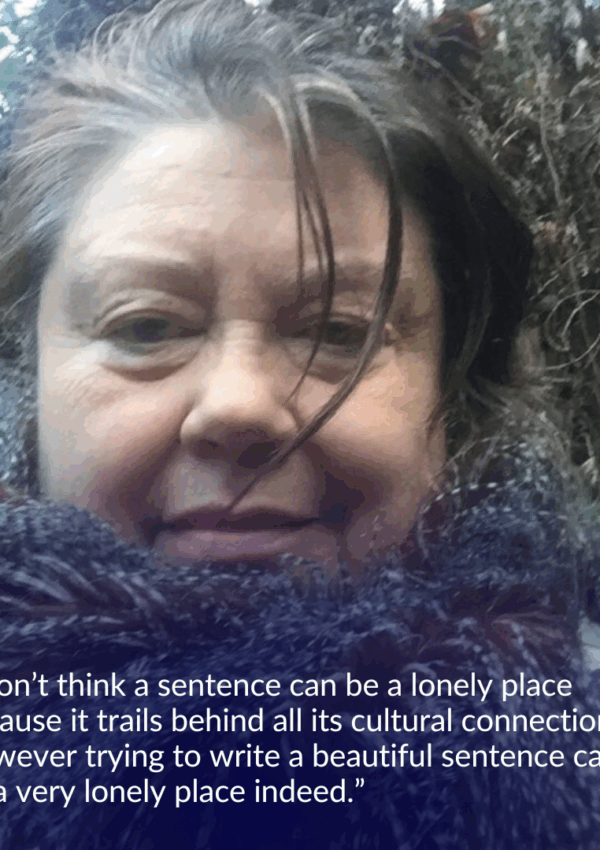Interview by Alicia Cole
Before being gainfully employed as a mild mannered bureaucrat toiling mindlessly in the bowels of one of Corporate America’s numerous cube farms, Rob Mosca was haunted by dreams of becoming an author. Envisioning a lush life of sleeping in until noon, courting delightfully sordid muses and growing a thick nicotine stained beard, he decided that the recent economic downturn was as good a time as any to quit his steady day job in order to write the Great American Novel. He has had no regrets in pursuing this new occupation save having to subsist on a steady diet of Ramen Noodles, Little Debbie snack cakes and copious amounts of Mad Dog 20/20.
High Midnight is his first novel, a homage to the Midnight Movies he grew up on and the gritty pulp men’s magazines he would peruse in the back of his grandfather’s closet as a child. Currently moonlighting as a night club door man for “walking around money,” he occasionally DJs and frequently blogs under the nom de guerre of Jack Babalon, in his adopted hometown of Terminus, Ga.
BF: What first drew you to the genres of horror and western?
RM: For me, horror and western are two sides of the same coin, in that they are both literary genres that offer dispatches of the individual contending with those frontiers beyond the known. The western is often the tale of the Apollonian or civilizing power (the ego often personified in the form of lawman or white-hat donned cowboy) battling the Dionysian or animalistic power (the Jungian Shadow cast by the lawless town or black-hat outlaw). On the other hand, horror is often a delightfully gruesome reminder of the limitations of the ego in the face of the Shadow.
As such, I found by combining the two that they offered the widest canvas for my imagination to paint with.
But if you mean by what spark was I first moth-drawn to these genres, I’d have to blame my parents who instilled a love of zombie movies and spaghetti westerns at an early age.
BF: Who inspires you?
RM: Almost every writer I take the time to pursue. There’s nothing quite like that thrill of coming across a line in a book or a comic book, or even a movie to be honest, that makes you stop and nod at either the truth or the beauty of its expression. Sometimes I’ll catch a stray line out of an article in a magazine and think wow, then immediately find my thoughts tinkering and deconstructing whatever I’m working on.
Hell, even the shitty writers inspire me so far as they make me go: “Don’t write like that!”
Literary inspirations, however, would be William S Burroughs (“The Place of Dead Roads” with its surreal gunfighter sections certainly sparked my imagination with High Midnight). Walt Whitman, Charles Bukowski, James Ellroy, Robert Anton Wilson, and Anais Nin come to mind. But also the comic book writers such as Grant Morrison, Warren Ellis, Alan Moore, and Garth Ennis. High Midnight, however, owes a lot to an old 80s comic called Grimjack by John Ostrander and Timothy Truman, in that it combined elements of the hardboiled detective with the post-apocalyptic/sci-fi wonder and bloody sword and sorcery mayhem.
Finally, Nick Cave and Tom Waits, in that I’m constantly amazed at how much heartbreak, truth, and beauty can be fit into a five-minute song.
BF: What was the most enjoyable part of writing your novel, High Midnight?
RM: Quitting my job at the cube farm, cashing in my 401K, and knowing whether it got published or not, whether it was good or not, whether it was the right move or not, that in writing HM I was going to be the man I always wanted to be: A writer.
BF: What has your experience been like self-publishing versus signing with a publisher?
While at times I got frustrated with having to negotiate my “baby” with a publisher, dealing with all the scenes cut, the words changed, the added scenes, the haggling, and explaining what should be evident, the truth is that until I got Dark Moon Books to put out my work, being self-published felt like coming in 5th place in a race and having to make my own trophy to commemorate the occasion.
But that’s just me and there are many amazing books out there that are self-published.
BF: You’re taking your work to film, correct? What’s this experience like?
RM: Currently I have a short story, “Memento Maury,” being adapted by some local filmmakers into a short. I’d say, from this brief intersection of my work with film, is that it’s a lot of fun. The trick is to remember that once you put your work into someone else’s hands it will no longer be your work. Which isn’t always a bad thing. A more faithful adaptation of Philip K Dick’s Do Androids Dream of Electric Sheep? might not have given us a film half as awe inspiring as Bladerunner.
The best bet seems to be learning to write screenplays if you want total control, and even then don’t expect what goes in to be what comes out.
BF: What’s in store for you in terms of sequels and other fictional worlds?
RM: Confessions of a Fuck Up Artist is my second novel, of which I’ve written a first draft, and is part autobiography, part polytemporal magickal rite of initiation. It’s about my moving to the city of Terminus after getting kicked out of the Navy for failing my government mandated piss test and subsequent arrest. It involves drugs, Egyptian gods, punk rockers, sailors, goths, and an LSD fueled flight across Mardi Gras.
Fun for the whole family.
I’ve also got a novella coming out called The Guns of Innsmouth, which if I had to give you the elevator pitch would say, it’s Lovecraft meets Boardwalk Empire.
BF: If you could leave a time capsule in the desert for an alternative future Mad Maxian tribe, what would it contain and why?
A bottle of bourbon, a first-aid kit, a few MREs, a manual on wilderness survival, a sawed off shotgun with enough ammo to shoot your way out of a mutant filled ambush, a copy of Leaves of Grass, water purification tablets, a lighter, two joints of Wu-Tang Clan worth green, a pair of sunglasses, and a Swiss army knife.
I do this not only because I care about whatever hapless survivor has stumbled upon my time capsule, but because this is what the time-traveler had on him and it was only fitting that his belongings were buried along with him.
You can find Rob Mosca’s High Midnight on the Dark Moon Books website:
And also at the direct link to Amazon’s High Midnight page:




